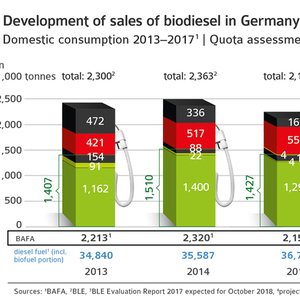Germany consumed more UCO biodiesel last year than RME

Image: UFOP
November 6, 2017
BY Ron Kotrba
Germany’s Office for Agriculture and Food (BLE) has published an evaluation and progress report for 2016 in which it shows that, for the first time, consumption of biodiesel from used cooking oil (UCO) in Germany exceeded that of rapeseed biodiesel (RME). The total consumption of waste oil biodiesel in 2016 was approximately 868,000 metric tons (more than 260 million gallons) while use of rapeseed biodiesel topped off at 860,000 tons.
A significant drop was seen in German RME consumption from 2015 to 2016, down from nearly 1.3 million tons to 0.86 million tons—a difference of 440,000 tons. Meanwhile, the proportion of UCO biodiesel has been steadily increasing.
Advertisement
The primary reason for this “worrying finding,” according to Germany’s Union for the Promotion of Oil and Protein Plants (UFOP), is the legal obligation to reduce greenhouse gases, introduced in 2015.
“UFOP had fundamentally welcomed this changeover as a unique selling point in the bioeconomy for using renewable resources and as a means of paving the way to decarbonize the economy as a whole,” UFOP stated. “Due to the recent development, German oil millers are increasingly having to rely on the export of rapeseed oil.”
Not only does the organization, which represents rapeseed farmers and crushers, find troubling the fact that German UCO biodiesel consumption has surpassed RME biodiesel as a result of the country’s GHG quota, but also that the physical consumption of biodiesel overall has decreased as the GHG efficiency of biodiesel has improved. The BLE report confirms GHG savings of 77 percent from biofuels, which is higher than previous accounts. “The actual share of biodiesel in the fuel market therefore dropped from 5.84 percent in 2015 to 5.68 percent in 2016,” UFOP stated earlier this year.
Advertisement
UFOP suggests these phenomena indicate the need to increase the GHG quota to, at minimum, match the admixture proportion stipulated in the diesel fuel standard of 7 percent by volume.
“…The raw materials efficiency documented by the BLE report already enables a greater level of climate protection in the transport sector today,” UFOP stated. “This potential must be reached. UFOP notes that even waste oils are finite resources and therefore high demands would have to be laid upon the quality of the certification, so that waste oils and fats are not withdrawn from use anywhere else and, in turn, fossil fuels would have to be used.”
Related Stories
The USDA has announced it will delay opening the first quarterly grant application window for FY 2026 REAP funding. The agency cited both an application backlog and the need to disincentivize solar projects as reasons for the delay.
CoBank’s latest quarterly research report, released July 10, highlights current uncertainty around the implementation of three biofuel policies, RFS RVOs, small refinery exemptions (SREs) and the 45Z clean fuels production tax credit.
The USDA significantly increased its estimate for 2025-’26 soybean oil use in biofuel production in its latest World Agricultural Supply and Demand Estimates report, released July 11. The outlook for soybean production was revised down.
U.S. fuel ethanol capacity fell slightly in April, while biodiesel and renewable diesel capacity held steady, according to data released by the U.S. EIA on June 30. Feedstock consumption was down when compared to the previous month.
The U.S. EPA on July 8 hosted virtual public hearing to gather input on the agency’s recently released proposed rule to set 2026 and 2027 RFS RVOs. Members of the biofuel industry were among those to offer testimony during the event.
Upcoming Events










